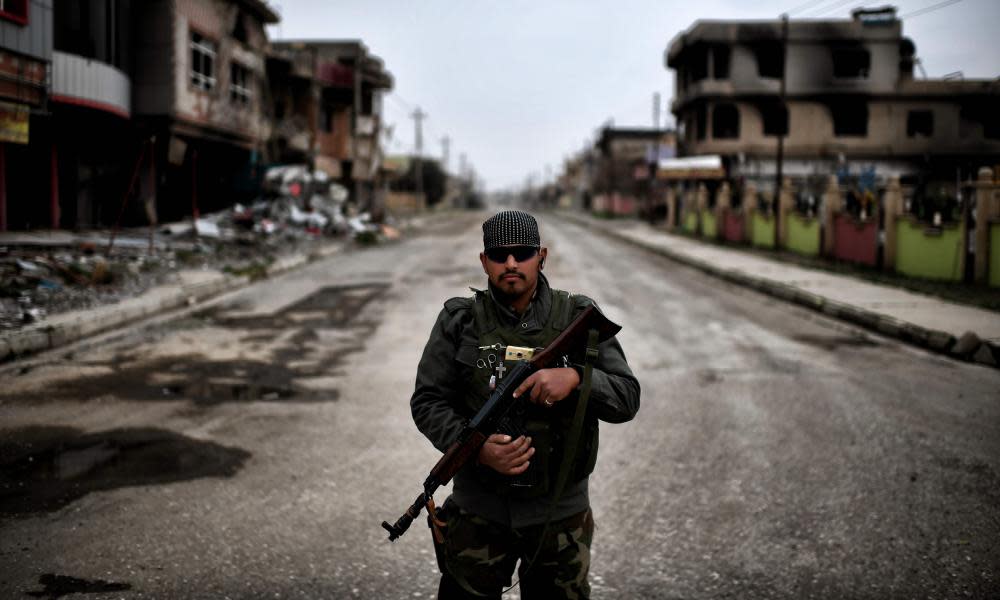When Mosul is liberated a new chapter in political policymaking must begin | Ranj Alaaldin

There is a crisis of authority and security in the Middle East and North Africa that will continue even after the defeat of Islamic State and the military campaigns in Iraq and Syria. Mosul’s liberation and the eventual fall of Raqqa will signal the end of the “caliphate” but it could also mark the beginning of the era of armed groups.
Like never before in the region’s modern history, the fragility of states and the collapse of institutions now threatens the nation-state system. Sub-national identities based around ethnicity and religion have thrived in these uncontested spaces and have become powerful mobilisers of people and resources. And it is not so much the banal, potentially reversible and constantly evolving challenges of identity and sectarian politics that should worry the international community but the rise of violent non-state actors.
They can be called anything from terrorists, tribes, militias and paramilitaries, depending on your perspective but these increasingly sophisticated groups have filled the gap left by the decline of the state and enjoy extensive overlap with the local population, often enjoying substantive popular legitimacy. Some have even transformed themselves into socio-cultural actors with their own weekly newspapers, schools, clinics and sermons. They have already become administrators of territory and the providers of services and security. Some even regularly interact with the state, as in Iraq where militias have held ministerial posts and dominate key ministries.
In other words, these actors are here to stay and are well positioned to maintain the status quo. This has consequences for the way governments, businesses and international organisations interact with a region that presents opportunities as much as it does threats to national security. It may soon no longer be plausible to do “business” with the region as we have done before.
Businesses wanting to capitalise on the commercial opportunities in the region, governments looking to resolve matters of national security and humanitarian organisations looking to reach beleaguered communities may no longer be able to achieve their objectives simply by engaging with the elites of Baghdad, Damascus or other capitals. If at some point the British government wishes to resolve a crisis involving British subjects, it is the militias, tribes and even religious leaders that dominate on the ground who will determine their fate. While this was once the exception, it is increasingly becoming the norm.
While once upon a time there may have been the political willingness and resources to invest in fragile states, this is no longer the case. As has been evident with the advent of the Trump administration, internationally there is a pushback against the notion of continuing to invest billions of dollars into states and elites that have little to show for such resources, as in the case of Iraq. In the current global order, governments are grappling with their political and economic challenges at home.
This architecture and system of governance is not sustainable – the transformation of militia heads and armed groups into the administrators of a state, groups who have little regard for international norms and human rights and whose making is religious conflicts, is not an ideal formula for good governance. Political stability and security interact with one another to enable job creation, public services and the alleviation of the humanitarian crises that not only produced militant groups like Isis but that have also resulted in the refugee flows to Europe and elsewhere.
The challenge for the international community is to accept the changing dynamics in order to be better positioned to respond to the threats it presents. That requires rethinking the way the international system accounts for these still evolving, but soon to be crystalised, structures of governance and security.
The orthodox approach to combating groups like Isis or sectarian militia groups is no longer plausible; on its own, investing billions of dollars in capacity building and institution-building process or security sector reform will no longer yield the necessary dividends. Violent non-state actors are often battling for the state and the resources that are thrown its way from the international community, as much as they are with their rivals. Indeed, international resources often end up in the hands of the men with the guns and money.
State-building initiatives should continue nonetheless – where the armed groups fail to provide basic services and security, the local population will push them to the margins but only if there is an alternative to take their place. The international system needs to become more flexible so that it takes account of, and supports, the groups that are willing to embrace international norms and whose longevity is not dependent on ethnic and sectarian tensions.
There are good and bad armed groups. What makes Syria’s Kurds reliable and easy allies for the west in the war against Isis is their ambitions to integrate into the international system. They speak the language of democracy and the rule of law, pursuant to their status as state-builders. Similarly, there are Shia militias in Iraq who seek integration into existing institutions. This is in stark contrast to their rival Shia militias who aspire to replace existing state institutions such as the Iraqi military.
Policymakers must look to the actors who envisage and aim for pluralistic, non-sect based institutions. Isolating these actors and marginalising them in the same way as malevolent groups will bring more problems than solutions. Investment should go toward the communal, grassroots dynamics to achieve stability. Civil-society actors (including NGOs, tribes and religious leaders) across the region have greater reach and moral authority than the bureaucrats and corrupt elites. Yet, they are not accommodated properly and lack the resources and autonomy that can enable them to affect change on the ground, to challenge the corrupt elites as well as the nefarious militias and militants who spread disorder and violence.

 Yahoo News
Yahoo News 
